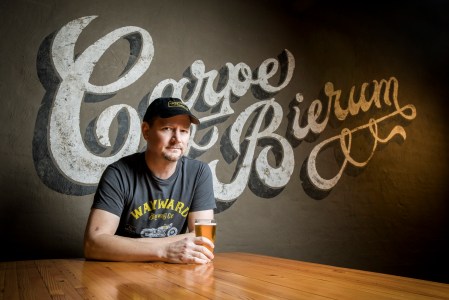
A new cooperative of independent Australian breweries has launched with the founding members of the Local Drinks Collective Wayward and Batch saying it “represents a new phase in the evolution of Australian independent brewing”.
Initial chair of the Local Drinks Collective (LDC) Peter Philip (pictured), who is Wayward’s owner and the former chair of the Independent Brewers Association, said it’s a new paradigm in the Australian beer market.
“This has the potential to be one of the top three independent brewing collectives in Australia within three years,” he said in a statement.
The founding participants said it has been established to address the economies of scale challenges independent breweries face in a competitive market, like distribution logistics and production growth, and to help them stay independent while competing with Kirin, owners of Lion, and Asahi, owners of Carlton & United. The LDC said it’s in discussions with a “number of other regional breweries” to give the collective “national coverage”.
The LDC said its cooperative structure, that’s owned by member breweries, will involve the creation of a distribution, sales and services company to see the business models of small and regional breweries become more effective, sustainable and ultimately more profitable. It’s also been structured so spare production capabilities of participants are available to all its members.
“This is not a sell-out or a rollup”, Peter added. “Each member brewery… retains its unique identity, its brands and its founders with the collective providing services to each of the breweries to help everyone succeed in an ever-increasingly competitive market that is
dominated by massive multinational beer companies.”
The LDC said it borrows from the traditions of certain European winemakers who have a track record of combining forces in the shared areas of production, marketing and distribution for the mutual benefit of participants.
“The structure allows for individual brands to grow without needing to duplicate expensive infrastructure, allowing the winemaker to focus on their craft while gaining the economies of scale necessary to compete in a market dominated by multinationals – exactly the same issues faced by Australian independent brewers.
“The Local Drinks Collective borrows from this tradition to provide common functions that are necessary for Australian independent breweries to grow their businesses in an increasingly competitive market while maintaining the innovation that made them successful in the first place.”
The LDC added: “Other models have emerged in Australia in the last few years that seek to provide some economies of scale, but they have largely faltered because the members of these groups have no incentives to work together.
“The Local Drinks Collective addresses the flaw in alternative models through an ownership model that means that every participant shares in the growth of the collective. Thus, the members have an incentive to cooperate and grow every brand in the collective.
“The Local Drinks Collective provides distribution efficiencies for customers who can deal with one entity rather than many individual breweries. It also means the collective can more effectively partner with national retailers to make the products of the partner members more available to consumers nationally.
“With these diversified sources of revenue, the collective will over time become a more attractive entity for raising capital. Long-term the collective will provide liquidity opportunities for shareholders without the need to ‘sell out’ to big beer – and it is this element that ensures that the collective is a sustainable model for independent beer to truly stay independent.”
